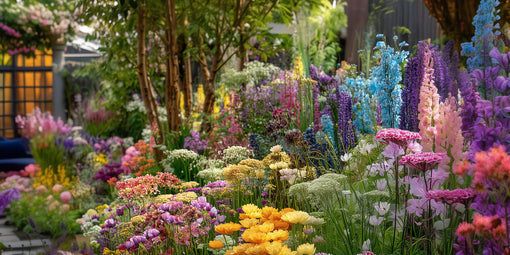
- Article published at:
Drawer menu

Pollination is a fundamental ecological service, essential for the reproduction of over 75% of flowering plants, including many crops. Bees, the most effective pollinators, contribute significantly to the production of fruits, vegetables, and nuts. It's estimated that one-third of the food we consume relies on pollination. Honeybees, bumblebees, and solitary bees each play distinct roles in this process. Honeybees are known for their ability to pollinate on a large scale, bumblebees excel at pollinating certain crops due to their larger size and longer tongues, and solitary bees are efficient pollinators for specific plants due to their solitary nesting habits.

Despite their importance, bee populations worldwide are in decline due to a combination of factors:
The decline in bee populations threatens global agriculture and biodiversity, leading to potential food shortages and the loss of plant species dependent on pollinators.
Flower farms and bees share a mutually beneficial relationship. Flower farms provide bees with abundant food sources, while bees enhance the farm's productivity through effective pollination. Healthy bee populations can lead to increased flower yields, higher quality blooms, and more robust plants. This symbiotic relationship underscores the importance of flower farms in bee conservation efforts.

Flower farms can adopt several strategies to create a supportive environment for bees.
One effective approach is creating pollinator-friendly habitats by planting a diverse range of native flowers that bloom at different times, ensuring a continuous supply of nectar and pollen throughout the year. Additionally, maintaining wildflower strips and hedgerows can provide bees with extra food sources and nesting sites.
Reducing pesticide use is another crucial strategy. By implementing Integrated Pest Management (IPM) techniques, flower farms can minimize their reliance on harmful chemicals. Opting for organic and bee-safe pesticides further protects bee health, ensuring that these vital pollinators are not harmed by toxic substances.
Providing water sources is also essential for supporting bee populations. Setting up shallow water dishes with stones or marbles allows bees to drink safely without the risk of drowning. This simple yet effective measure can significantly enhance the wellbeing of bees on flower farms.
Habitat protection and restoration are key to maintaining ecological balance. By preserving existing natural habitats and restoring degraded areas, flower farms can offer bees a safe and thriving environment. This practice not only benefits bees but also contributes to the overall health of the ecosystem.
Supporting bee nesting is another important strategy. Flower farms can provide nesting sites for solitary bees by creating bare soil patches and leaving hollow stems in place. Installing bee hotels, which offer artificial nesting sites, can further support solitary bee populations, ensuring they have safe places to reproduce and thrive.

Several flower farms have successfully implemented bee-supportive practices, demonstrating positive outcomes:
The Blooming Bee Haven: This flower farm in Devon has dedicated 10% of its land to wildflower meadows, resulting in a significant increase in local bee populations. The farm reports better flower yields and a noticeable improvement in bloom quality.
Pollinator Paradise Farm: Located in Sussex, this farm has adopted a pesticide-free approach and established extensive wildflower borders. They have observed a diverse range of pollinators, including rare bee species, contributing to the farm's overall health and productivity.
Supporting pollinators on flower farms has broader environmental benefits. Healthy bee populations contribute to the pollination of wild plants, supporting overall biodiversity. This, in turn, creates resilient ecosystems that can better withstand environmental changes and support a variety of wildlife. Practices that benefit bees often also support other beneficial insects and animals, leading to a healthier, more balanced environment.
Flower farms can play a pivotal role in educating the public about the importance of bees. By engaging with local communities through workshops, farm tours, and educational programs, farms can raise awareness about pollinator conservation. Partnerships with schools and community groups can foster a culture of environmental stewardship and encourage practices that support bees at home.

Pollinators like bees are indispensable to both natural ecosystems and agricultural production. Flower farms have a unique opportunity to support bee populations by creating pollinator-friendly habitats, reducing pesticide use, and fostering community involvement. The benefits extend beyond the farm, promoting biodiversity, enhancing environmental health, and securing food production. As the demand for sustainable practices grows, flower farms can lead the way in protecting and supporting our vital pollinators, ensuring a brighter future for both agriculture and the natural world.